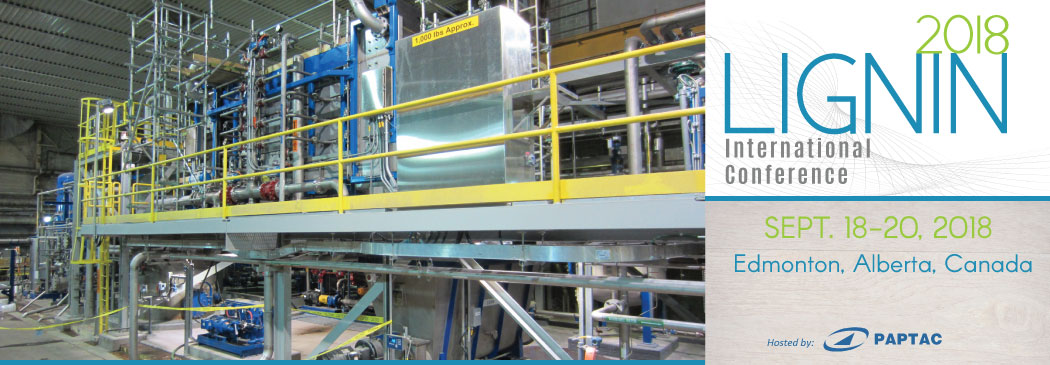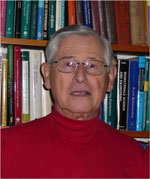

Wolfgang G. Glasser is Prof. Emeritus of Sustainable Biomaterials at Virginia Tech. Since obtaining a doctorate in Hamburg, Germany in 1969, his research and teaching efforts focussed on high-value uses of sustainable bioresources by means of chemistry. As a member of an interdisciplinary center for polymers and materials (PMIL), his work focused on polysaccharides and lignin and resulted in more than 200 publications and 20 patents. In the 2000-2012 time period, he served as the Editor-in-Chief of the periodical Cellulose by Springer. His scientific contributions were recognized by several awards and honours including TAPPI’s George Olmsted Award (1974), the IUFRO’s Scientific Achievement Award (1986) and American Chemical Society’s Anselme Payen Award (2000). Several of his research efforts resulted in commercial start-up ventures.
Mr. Glasser will be speaking on the “OPPORTUNITIES AND CHALLENGES OF LIGNIN UTILIZATION AS BIOPOLYMER” -- Lignin serves Nature in many roles, most importantly as modulus-building adhesive in bio-composites consisting of crystalline and non-crystalline polysaccharides. Despite the stark difference in molecular make-up between fibers and “matrix” (i.e., lignin), the bio-composites never fail interfacially. This behavior can be attributed to lignin’s native architecture as a (block) copolymer component with non-crystalline carbohydrates. Delignification (i.e., pulping) results in molecular and architectural changes that vary significantly in type and degree, often without destroying the potential for re-use in solid bio-materials. A wide range of options for the recovery of useful polymer properties is available that include both molecular filtration and chemical (or biochemical) modification. This talk will review both opportunities and challenges for lignin to serve as biodegradable and sustainable partner in thermoplastic and thermosetting structural polymeric materials.
Mr. Glasser will be speaking on the “OPPORTUNITIES AND CHALLENGES OF LIGNIN UTILIZATION AS BIOPOLYMER” -- Lignin serves Nature in many roles, most importantly as modulus-building adhesive in bio-composites consisting of crystalline and non-crystalline polysaccharides. Despite the stark difference in molecular make-up between fibers and “matrix” (i.e., lignin), the bio-composites never fail interfacially. This behavior can be attributed to lignin’s native architecture as a (block) copolymer component with non-crystalline carbohydrates. Delignification (i.e., pulping) results in molecular and architectural changes that vary significantly in type and degree, often without destroying the potential for re-use in solid bio-materials. A wide range of options for the recovery of useful polymer properties is available that include both molecular filtration and chemical (or biochemical) modification. This talk will review both opportunities and challenges for lignin to serve as biodegradable and sustainable partner in thermoplastic and thermosetting structural polymeric materials.

Prof. Ludo Diels works at the University of Antwerp, and is research manager Sustainable Chemistry for the Flemish Institute for Technological Research (VITO) in Mol, Belgium. For about 15 years, he managed the Environment and Process Technology Business Unit and is now responsible for the transition toward sustainable chemistry and clean technology. Ludo Diels is strongly involved in the set up of a biobased economy in Flanders. He is also responsible for the organisation of collaborations with the academic and industrial World and for co-financing projects. Furthermore, he co-ordinated and is involved in many international research projects. He is presently the chairman of the working group FEED in the Energy and Resources PPP-SPIRE between 8 industrial sectors and the European Commission and member of the SPIRE-BBI working group.
Prof. Diels will be speaking on: “Membrane separation technology as a valuable and efficient tool in the value chain of wood towards chemicals and materials”. Bio-based chemicals are expected to grow significantly and increase their share of the global chemical production in the coming years. Today nearly all aromatic chemicals and building blocks originate from fossil oil, whereas lignin – nature’s second most abundant polymer after cellulose – could provide a valuable renewable aromatic resource for the chemical industry. Conversion of presently underutilized lignin by-products (e.g. from pulp and paper industries) into high performance biomaterials calls for development of new and/or optimized process technologies. The potential of membrane processes in different aspects of the wood-to-aromatics value chain will be illustrated through some recent case studies. The potential applicability of the resulting fractions of lignin derivatives in polymer applications will be discussed.
Prof. Diels will be speaking on: “Membrane separation technology as a valuable and efficient tool in the value chain of wood towards chemicals and materials”. Bio-based chemicals are expected to grow significantly and increase their share of the global chemical production in the coming years. Today nearly all aromatic chemicals and building blocks originate from fossil oil, whereas lignin – nature’s second most abundant polymer after cellulose – could provide a valuable renewable aromatic resource for the chemical industry. Conversion of presently underutilized lignin by-products (e.g. from pulp and paper industries) into high performance biomaterials calls for development of new and/or optimized process technologies. The potential of membrane processes in different aspects of the wood-to-aromatics value chain will be illustrated through some recent case studies. The potential applicability of the resulting fractions of lignin derivatives in polymer applications will be discussed.

Tom Browne holds a bachelor`s degree in mechanical engineering and a doctorate in chemical engineering, both from McGill University. He joined FPInnovations in 1994 to work on energy use in pulp and paper processes. As Research Manager for Biorefinery and Bioenergy from 2006 to his retirement in 2016, he managed a research team developing and commercializing novel biorefinery processes for the pulp and paper industry. Among other successful commercialization exercises, his team developed, patented and licensed out the LignoForce™ system for removing lignin from kraft black liquor, and supported its move to full commercial implementation. He has published a number of papers on the techno-economic conditions necessary for the success of the forest biorefinery, including key contributions to the Future Bio-Pathways Study conducted by FPInnovations in association with the Forest Products Association of Canada and the Canadian Forest Service (a branch of Natural Resources Canada).
Tom Browne will present a seminar entitled: “Commercial uses of kraft lignin: lessons learned”. This paper will attempt to identify key obstacles, drivers and pathways in the quest to develop novel, non-fuel uses of lignin from kraft pulp mills. Past examples of kraft lignin applications to be discussed include: the use of kraft lignin supplied by the Howard Smith Paper Mills of Cornwall, Ontario and used as an adhesive in the Arborite process for a number of years as a replacement of a very expensive petroleum-based alternative as well as the case of West Virginia Pulp and Paper Company, later Mead WestVaco (now Ingevity), which moved to higher value products from kraft lignin (e.g. sulphonated lignin dispersants). The paper will conclude by focusing on the present global situation with respect to lignin market dynamics and the applications that appear to make sense in the present economic climate.
Tom Browne will present a seminar entitled: “Commercial uses of kraft lignin: lessons learned”. This paper will attempt to identify key obstacles, drivers and pathways in the quest to develop novel, non-fuel uses of lignin from kraft pulp mills. Past examples of kraft lignin applications to be discussed include: the use of kraft lignin supplied by the Howard Smith Paper Mills of Cornwall, Ontario and used as an adhesive in the Arborite process for a number of years as a replacement of a very expensive petroleum-based alternative as well as the case of West Virginia Pulp and Paper Company, later Mead WestVaco (now Ingevity), which moved to higher value products from kraft lignin (e.g. sulphonated lignin dispersants). The paper will conclude by focusing on the present global situation with respect to lignin market dynamics and the applications that appear to make sense in the present economic climate.

Mikhail Balakshin is a Professor of Practice in Lignin Chemistry at Aalto University. He graduated from Leningrad (currently St. Petersburg) Forest Technical Academy (Russia) with an Engineering Degree in Pulp and Paper Industry (1987) and a PhD in Wood Chemistry (1991). His major academic achievements are in development of state-of-the-art analytical methods in lignin characterization and their implementation in fundamentals of various lignocellulosic conversion processes as well as elucidation of the correlation between the structure of lignin with processing parameters and structure-performance relationships in lignin applications. He also held senior R&D positions at biorefinery companies in Russia, Canada and USA (for about 12 years in total) focusing on process development and industrial applications of lignins and other biomass components.
Dr. Balakshin’s talk will focus on “The development of efficient methodology for the valorization of technical lignins”. Besides its fundamental importance, such an approach has a great practical value for quality control needed to ensure the consistency of lignin as a chemical feedstock, IP protection (patenting) of different lignin types as well as engineering lignin products via understanding structure-property-performance correlations. An efficient analytical approach should not only be reliable and informative but also high throughput due to the very large amount of potential lignin samples to be evaluated. Responding to these needs, an efficient approach for comprehensive characterization of structures of different lignins, their physical and colloidal properties will be discussed. Efficient evaluation of lignin performance in various applications is currently challenging due to lack of small-scale, high-throughput methods and, therefore, is often the bottleneck in lignin engineering. Certain methods that allow quick screening of a large number of lignin samples and correlate well with the application performance at the pilot scale will be described. The balance of fundamental and practical aspects in the valorization of industrial lignins will be demonstrated with specific examples.
Dr. Balakshin’s talk will focus on “The development of efficient methodology for the valorization of technical lignins”. Besides its fundamental importance, such an approach has a great practical value for quality control needed to ensure the consistency of lignin as a chemical feedstock, IP protection (patenting) of different lignin types as well as engineering lignin products via understanding structure-property-performance correlations. An efficient analytical approach should not only be reliable and informative but also high throughput due to the very large amount of potential lignin samples to be evaluated. Responding to these needs, an efficient approach for comprehensive characterization of structures of different lignins, their physical and colloidal properties will be discussed. Efficient evaluation of lignin performance in various applications is currently challenging due to lack of small-scale, high-throughput methods and, therefore, is often the bottleneck in lignin engineering. Certain methods that allow quick screening of a large number of lignin samples and correlate well with the application performance at the pilot scale will be described. The balance of fundamental and practical aspects in the valorization of industrial lignins will be demonstrated with specific examples.

Tarja Tamminen is a Principal Scientist at VTT Technical Research Centre of Finland. She graduated from Helsinki University of Technology (now Aalto University) in Finland with a PhD degree in Organic Chemistry in 1991. Since 1992, she has worked in projects related to pulping and more generally wood processing chemistry, first at the Finnish Pulp and Paper Research Institute KCL and later at VTT. Her special topics of interest are analytical techniques for wood chemistry, especially for lignin. A large part of her research activities at the moment are related to the development of applications for technical lignins.
Dr. Tamminen will give a seminar entitled: “Monitoring lignin reactions in LPF synthesis”. Phenol formaldehyde (PF) resins are one of the most promising end uses for lignin. Realistically, part of the phenol can be replaced by lignin to produce Lignin-Phenol-Formaldehyde resins (LPF). So far, softwood lignins have been regarded as especially suitable for this application as they contain unsubstituted ortho positions in phenolic structures, which react with formaldehyde. However, recent results obtained at VTT, indicate that high reactivity of lignin with formaldehyde does not as such lead to high bonding strength. The seminar will discuss other factors that come into play in achieving high bonding strength in wood products in which LPF resins are used as the adhesive.
Dr. Tamminen will give a seminar entitled: “Monitoring lignin reactions in LPF synthesis”. Phenol formaldehyde (PF) resins are one of the most promising end uses for lignin. Realistically, part of the phenol can be replaced by lignin to produce Lignin-Phenol-Formaldehyde resins (LPF). So far, softwood lignins have been regarded as especially suitable for this application as they contain unsubstituted ortho positions in phenolic structures, which react with formaldehyde. However, recent results obtained at VTT, indicate that high reactivity of lignin with formaldehyde does not as such lead to high bonding strength. The seminar will discuss other factors that come into play in achieving high bonding strength in wood products in which LPF resins are used as the adhesive.

Keith Carter, Vice President Pulp and Energy Operations with West Fraser will give an introductory keynote on the development of Hinton Pulp’s state-of-the-art lignin production facility and West Fraser’s vision for lignin-based products and markets.

Dr. Richard Gosselink holds BSc and Ph.D. degrees in Chemistry. He is currently a Senior Scientist at the Wageningen Food & Biobased Research contract research organisation in the Netherlands where he co-ordinates lignocellulosic biorefinery and lignin chemistry and applications research. In these R&D projects, sustainable and cost-effective technologies are being developed together with industrial stakeholders within the biobased and circular economy.
Dr. Gosselink will be giving a seminar entitled: “Lignin as raw material for the development of biobased materials”. As lignin represents about 25% of lignocellulosic feedstocks, it has the potential to become an important biobased raw material for the production of biomaterials and aromatic chemical building blocks. Since lignin does not have one defined polymeric aromatic structure, the pro’s and con’s of using lignin in various applications will be discussed. Some examples of projects will be presented showing the evolution of lignin research to the demonstration stage for products in the fields of bio-asphalt, resins, rubber and construction materials. In some cases, enhanced lignin functionality needs to be achieved by chemical modification through esterification or fractionation. The future perspective of using lignin as a biobased raw material for the production of sustainable materials will also be discussed.
Dr. Gosselink will be giving a seminar entitled: “Lignin as raw material for the development of biobased materials”. As lignin represents about 25% of lignocellulosic feedstocks, it has the potential to become an important biobased raw material for the production of biomaterials and aromatic chemical building blocks. Since lignin does not have one defined polymeric aromatic structure, the pro’s and con’s of using lignin in various applications will be discussed. Some examples of projects will be presented showing the evolution of lignin research to the demonstration stage for products in the fields of bio-asphalt, resins, rubber and construction materials. In some cases, enhanced lignin functionality needs to be achieved by chemical modification through esterification or fractionation. The future perspective of using lignin as a biobased raw material for the production of sustainable materials will also be discussed.

Per Tomani holds a Master of Science in chemical engineering from the Royal Institute of Technology. He joined STFI (the Swedish Pulp and Paper Research Institute), today part of RISE, in 1991. At that time, he was active as a researcher and project leader with a focus on different challenges related to minimal water use in kraft pulping. Since 2001, he’s been active in the development of lignin separation from kraft black liquors and was the R&D Program Director of the FRAM and LignoFuel Programs under which the LignoBoost process was developed. He is one of the inventors of the LignoBoost process and was the responsible CTO when this process was scaled up in Bäckhammar, Sweden. His work today is focused on business development for RISE Bioeconomy. He is passionate about helping open up different commercial lignin value chains, such as lignin-based carbon fibres for composites, batteries, supercapacitors and hydrogen storage as well as lignin-based plastics and other applications. The infrastructure where the LignoBoost technology was upscaled is today an open innovation site called LignoCity.
Per Tomani will present a seminar entitled: “Development of kraft lignin applications”. This paper will focus on opportunities in the LignoCity infrastructure and the development of lignin-based carbon fibers/carbon nanofibers. Today, LignoCity serves as an open innovation site where ideas can be validated on a larger scale. The site can also serve as a production site during the early development phase when new applications are introduced to a market. This presentation will also discuss some general challenges of developing different lignin value-chains.
Per Tomani will present a seminar entitled: “Development of kraft lignin applications”. This paper will focus on opportunities in the LignoCity infrastructure and the development of lignin-based carbon fibers/carbon nanofibers. Today, LignoCity serves as an open innovation site where ideas can be validated on a larger scale. The site can also serve as a production site during the early development phase when new applications are introduced to a market. This presentation will also discuss some general challenges of developing different lignin value-chains.
